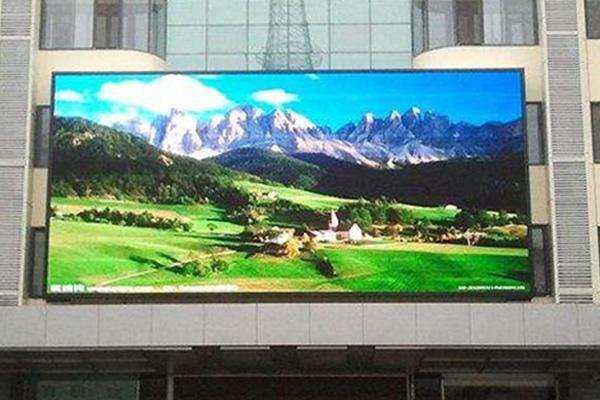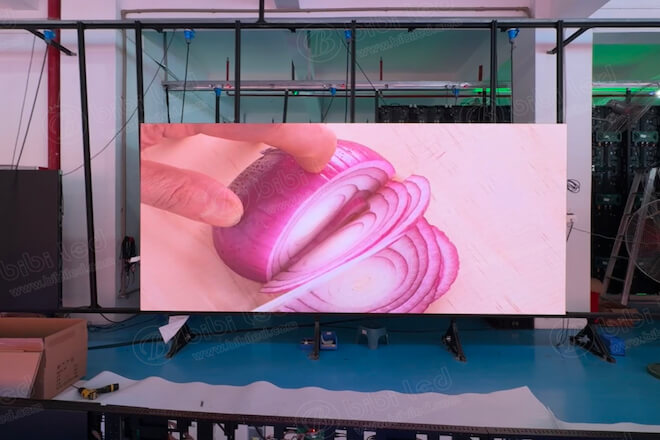
Introduction
In the pursuit of the ultimate visual experience today, LED curved screen, with its unique charm and unlimited potential, is gradually becoming the intersection of visual art and technological innovation. Imagine that when light and shadow are perfectly integrated with the curve, every viewing is like immersing in a new world.
This unprecedented shock and enjoyment is what this article will reveal to you.
This article will take you to explore the mystery of LED curved screen in depth, from its definition, technical principles to application scenarios, one by one. Let us unveil the mystery of LED curved screen together.
1. The relationship between LED curved screen and flexible LED screen
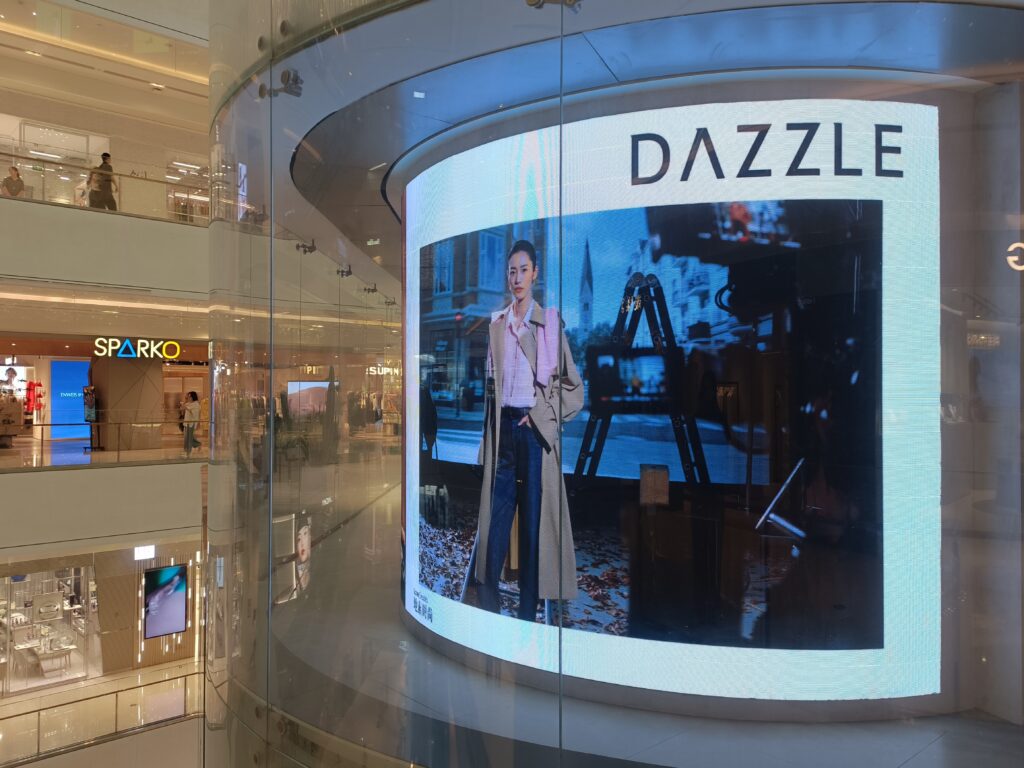
1). Flexible LED display
Imagine that you have a cloth-like display that you can bend, fold, or even roll up and put in your pocket. This magical display is a flexible LED display. It can not only be bent into a curved surface but also into various complex shapes, such as round, wavy, or even any shape you can imagine.
This display is very flexible and can adapt to various installation environments, allowing you to give full play to your creativity.
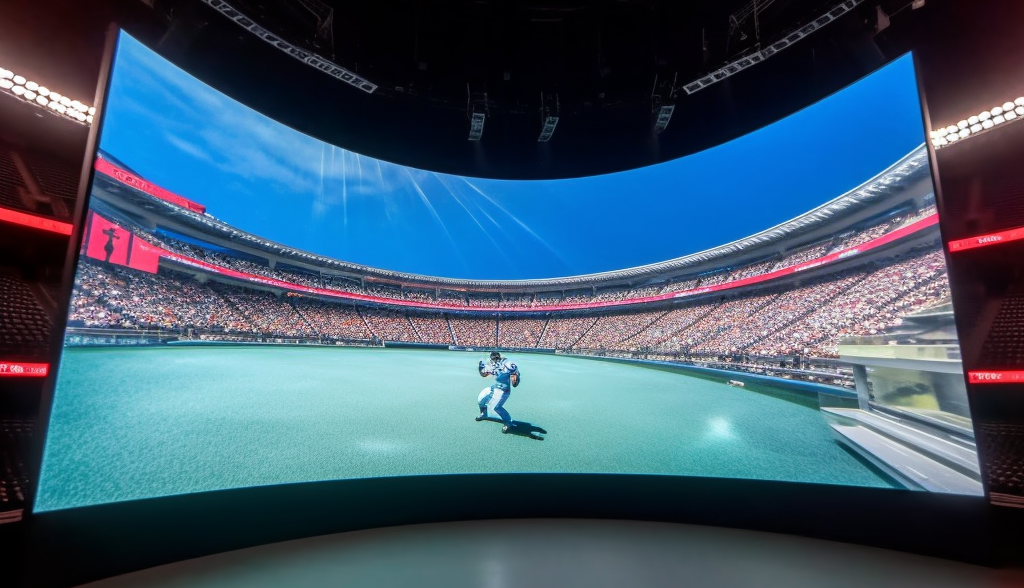
2). LED curved screen
Imagine that you walk into a movie theater and see that the big screen is not straight, but a little curved, like a slightly convex mirror.
This curved screen is the LED curved screen. It makes the picture look more natural, just like you are sitting at home watching TV, but the picture is larger, and because the screen is curved, no matter which angle you look at it, you can see it clearly without dead angles.
3). The relationship between them
Now, let’s take a look at the relationship between LED curved displays and flexible LED displays.
- Different application scenarios:
Although they can all bring better visual effects, the application scenarios are different. LED curved screens are more suitable for those occasions that require fixed curved effects, such as cinemas, shopping malls, etc. Flexible LED screens are more suitable for those occasions that require highly customized and deformable installation, such as stage performances, exhibitions, etc.
- Both are “deformations” of LED display:
Whether curved or flexible, they are a special form of LED display. LED display is like a screen composed of small light bulbs, and these small light bulbs can be arranged in different shapes and sizes.
- Flexible LED display can “become” a curved display:
Because the flexible LED display can be bent, it can easily “become” a curved display. However, not all LED curved displays can “become” flexible displays because some curved displays may be made of rigid materials and cannot be bent.
In general, LED curved screens and flexible LED screens are both “deformed” versions of LED screens, and they can both bring better visual effects and user experience. However, flexible LED screens are more flexible and can adapt to more application scenarios and creative needs.
2. How to make LED curved screens
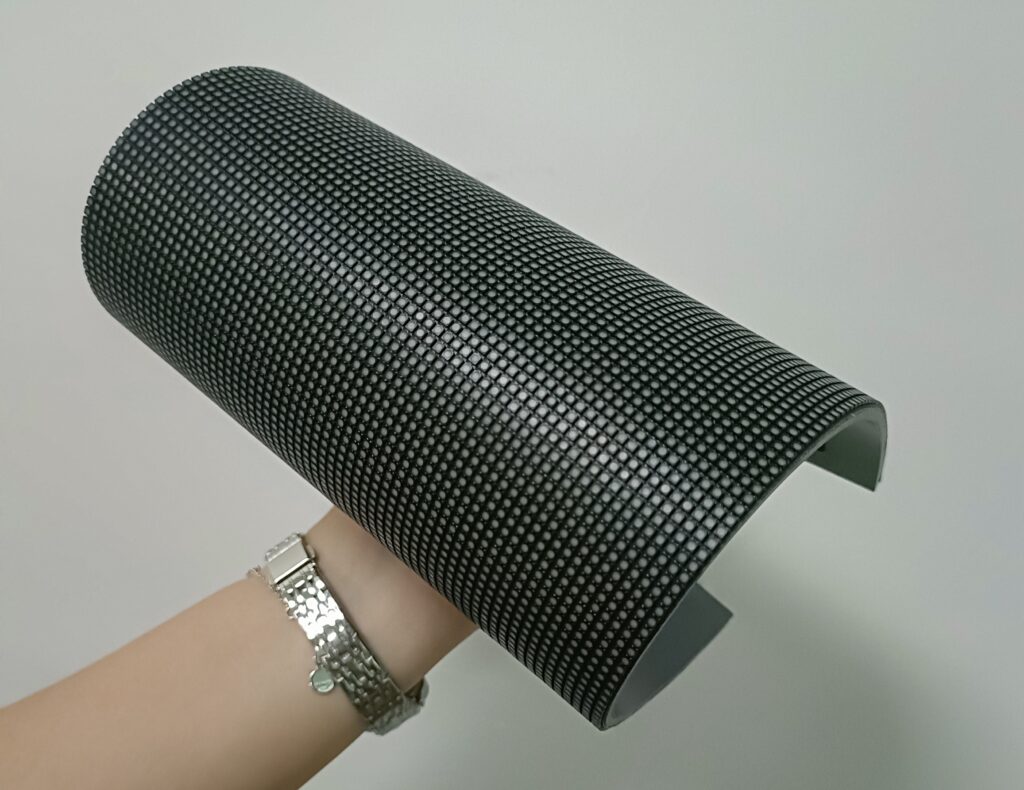
1). Use LED soft modules to make LED curved screens
1.1). Soft module characteristics
The main difference between LED soft modules and ordinary LED modules is their flexibility.
The soft module uses flexible base materials and circuit design, so that the entire module can be bent into various shapes, such as inner curved surface, outer curved surface, cylindrical and even wavy shape.
This flexibility enables the soft module to better adapt to the curved structure when splicing, achieve seamless splicing, and thus present a more natural and smooth curved effect.
1.2). Production process
- Design: First, design the appropriate curved shape and module specifications according to the size and shape of the installation environment. This includes determining the curvature of the surface, the size and quantity of the modules, etc.
- Make the bracket: According to the designed curved surface shape, make the corresponding mounting bracket. The curvature and size of the bracket need to match the designed curved surface shape to ensure that the module can be accurately installed on the bracket.
- Install the module: Install the soft module on the bracket in the designed order and position. Because the soft module is flexible, it can be easily bent into the required shape and fixed to the bracket through specific connection methods (such as magnetic suction, buckle, etc.).
- Debugging and testing: After the installation is completed, debug and test to ensure that the display effect and stability of the curved screen meet the requirements.

2). Realize the curved effect by using the arc lock of the rental LED display
2.1). The role of the arc lock
When renting an LED display, in order to achieve the curved effect, the arc lock is usually used to fix and adjust the bending angle of the module. The arc lock is a special connector that can adjust the bending angle of the module within a certain range to achieve the curved effect.
2.2). Implementation process
- Prepare modules: First, prepare a sufficient number of LED display cabinet, which can be conventional hard modules but need to be bent through arc locks.
- Install arc locks: Install arc locks between modules and adjust the bending angle of the modules as needed. The design of the arc lock allows fine-tuning within a certain range to ensure the accuracy and consistency of the curved effect.
- Splicing and fixing: Splice the modules with adjusted bending angles together and use specific fixing methods (such as screws, buckles, etc.) to firmly fix them together.
- Debugging and testing: Finally, debug and test to ensure that the display effect and stability of the curved screen meet the requirements of the lessee.
3. Application fields of LED curved screens
Due to their unique curved morphology, high definition, high brightness, and strong plasticity, LED curved screens have shown a wide range of applications and significant advantages in many fields. The following is a detailed and easy-to-understand introduction to the application fields of LED curved screens:
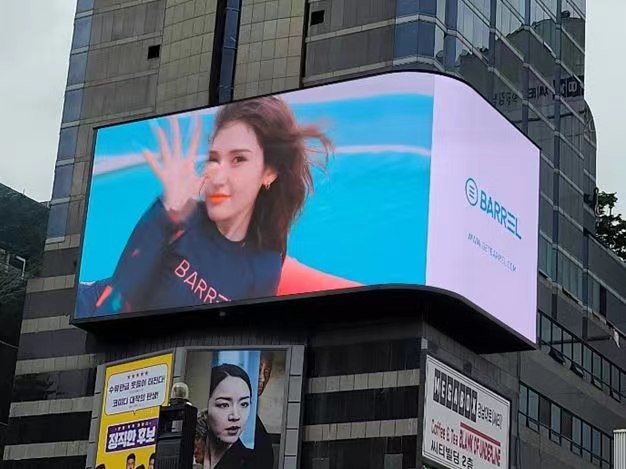
1). Architectural media facade
1.1). Application scenarios:
- Museums and art galleries:
Museums and art galleries use LED curved screens to display collection treasures, art exhibitions or educational content. Through the display effects of high definition and curved design, it provides the audience with a more vivid and intuitive viewing experience.
- City landmarks:
Applying LED curved screens to the exterior walls of city landmark buildings can display dynamic works of art, city promotional videos, or commercial advertisements. Add a beautiful landscape to the city and enhance the city’s image and cultural atmosphere.
1.2). Advantages:
- Integrated with the structure and style of the building itself to form a unique visual effect.
- Dynamic display content attracts people’s attention and enhances the cultural connotation and artistic value of the building.
- High flexibility and customizability meet the display requirements of different occasions and needs.
2). Commercial Advertisement
2.1). Application Scenarios:
- Brand Stores:
LED curved screens are installed in brand stores to display information such as brand image, product features, and promotional activities. Compared with traditional flat screens, curved screens can create more three-dimensional and rich visual effects and enhance brand image and customer shopping experience.
- Shopping Mall Atrium:
The atrium of the shopping mall is an important place for customers to rest and go shopping.
Installing LED curved screens here can play brand advertisements, promotional information, fashion shows and other content, adding vitality and attraction to the shopping mall.
The curved design makes the screen more suitable for the spatial structure, providing a wider viewing angle and immersive viewing experience.
- Outdoor Large Screens:
LED curved screens are often used as outdoor billboards in busy areas of the city, commercial centers, transportation hubs, and other crowded areas.
Its eye-catching appearance and curved design can attract the attention of passers-by and increase the exposure and attention of advertisements.
At the same time, the high-definition display effect makes the advertising content more vivid and realistic, which helps to convey brand information and product features.
2.2). Advantages:
- Increase advertising appeal and communication effect.
- The high-definition display ensures that the advertising content is vivid and realistic.
- The curved design enhances the visual effect and improves the viewing experience.

3). Entertainment performance
3.1). Application scenarios:
- Theater:
In theater performances, the LED curved screen can be used to display content such as the background of the play, character close-ups, or plot prompts.
Its high definition and flexibility can ensure that the performance effect is outstanding and enhance the audience’s sense of substitution and appreciation experience.
- Concert:
At the concert, the LED curved screen is used as the stage background or the screen above the audience.
It can play relevant pictures or special effects in real-time according to the content of the stage performance, interact with the performers, and bring a shocking visual experience to the audience.
The curved design makes the screen fit the shape of the stage, providing a wider field of view and immersion.
- Film and television shooting:
In the field of film and television shooting, LED curved screens are used as virtual backgrounds or props. By simulating real scenes or creating unique visual effects, it adds highlights and appeal to film and television works.
3.2). Advantages:
- Create a shocking visual experience and enhance the performance effect.
- The curved design provides a wider field of view and immersion.
- High flexibility and customizability to meet a variety of shooting needs.

Conclusion
In summary, as the new darling of modern display technology, LED curved screens are gradually changing our visual experience with their unique curved design, excellent display effects, and broad application prospects.
It not only shows great application potential in commercial advertising, entertainment performances, sports venues, and other fields, but also provides us with unlimited possibilities to explore a more intelligent, interactive, and immersive visual experience.
Finally, if you want to know more about LED displays, please get in touch with us.

